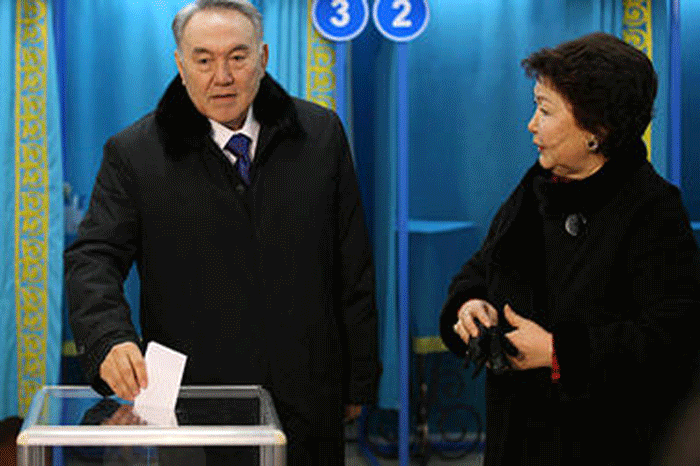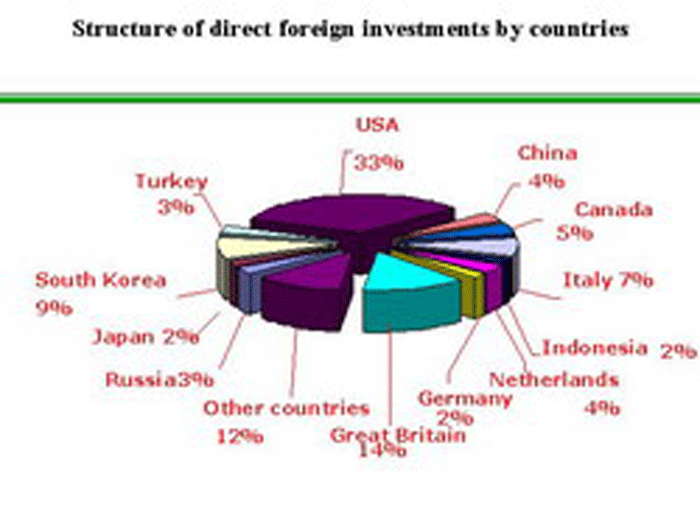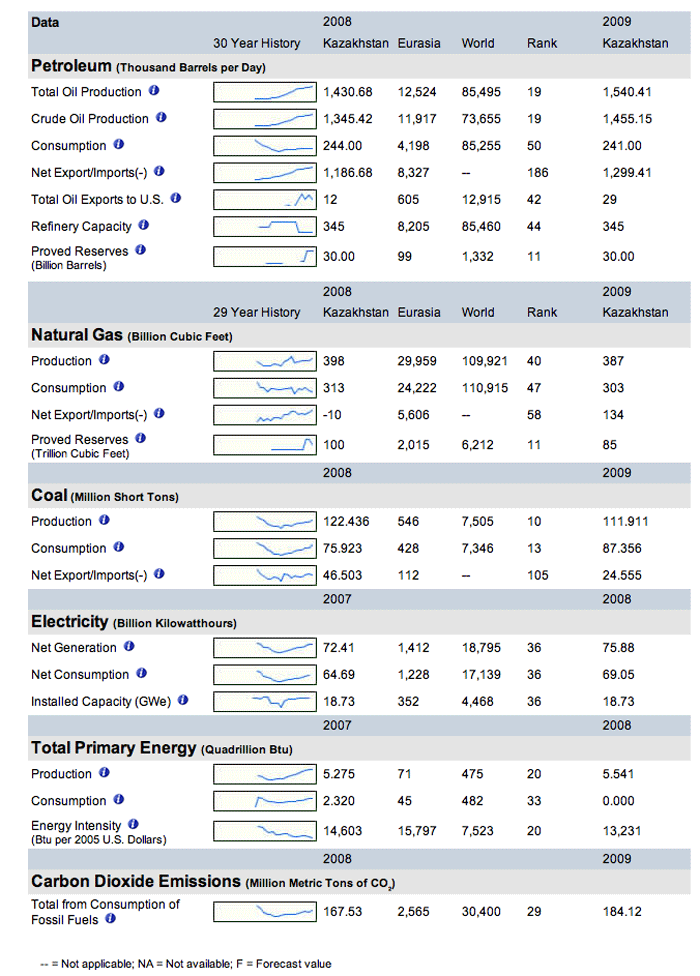By Richard Weitz
04/05/2011 – Americans’ preoccupation with the revolutionary upheavals in the Middle East, North Africa, and Afghanistan could lead us to overlook Kazakhstan’s April 3 presidential elections, which as expected reaffirmed the country’s current leadership and policies, and Kazakhstan’s important role in global security and other international issues.Kazakhstan has made the difficult transition from a planned to a market economy, and from a second-level republic of the Moscow-dominated Soviet Union to a fully independent country able to exert considerable influence within Central Asia and often beyond. The remaining transition, from a one-party dominated authoritarian country to a liberal democratic state in which multiple parties compete and win elections, might not occur until President Nursultan Nazarbayev, Kazakhstan’s president since the country gained independence in 1991, leaves the scene. Outside the Baltics, many of the other former Soviet republics have also found it difficult to make this transition. In the interim, U.S. interests will relate primarily to Kazakhstan’s energy potential and security policies.

President of Kazakhstan Nursultan Nazarbayev (l.) casts his ballot, with his wife Sara, during the Kazakhstan presidential election
at a polling station in Astana, Kazakhstan, Sunday, April 3.
Photo Credit: http://www.csmonitor.com/World/Asia-South-Central/2011/0404/Kazakhstan-s-snap-elections-draw-international-criticism
In early February of this year, Nazarbayev rejected a mass movement — which some analysts consider a trial balloon — to allow him to extend his term until 2020 by a national referendum. Possibly with some official prompting, more than half of the electorate backed the referendum proposal, which if adopted would have cancelled the 2012 and 2017 presidential elections. Kazakhstan’s national constitution specifies that the country’s President is elected by “universal, equal and direct suffrage by secret ballot for a five-year term.”
Western governments and non-governmental organizations recommended against holding the referendum, which they argued would have represented a backward step in Kazakhstan’s democratic development. Nazarbayev asked Kazakhstan’s Constitutional Court to consider the measure. On January 31, the Court ruled that the planned referendum would be unconstitutional. In response, Nazarbayev rejected the referendum proposal and instead announced that Kazakhstan would hold early presidential elections on April 3. U.S. State Department spokesman P.J. Crowley said that Kazakhstan had made “the right decision” in rejecting the referendum proposal.Although the decision to move up the date of the election is controversial, the results of this ballot have never been in doubt. In the previous presidential election of December 2005, Nazarbayev won with a majority of 91%. Still, this irregular process has aroused some domestic and foreign controversy. For example, some potential candidates have declined to participate, complaining that the sudden election decision left them unprepared to wage an effective campaign.
Kazakhstan committed to upholding democratic values as part of its campaign to secure Western approval for its campaign to become chairman of the Organization for Security and Cooperation in Europe (OSCE) in 2010. This was the first time a former Soviet republic had chaired the OSCE, let alone one from Central Asia. Kazakhstan did sufficiently well as chairman, including arranging to hold a heads-of-state summit last December, to have other former Soviet republics–Lithuania this year and Ukraine in 2013 — elected as its successors. Not with standing Western hopes that serving as OSCE chairman would make Kazakhstan more democratic, the main reason why the other OSCE members decided by consensus to designate Kazakhstan as OCSE chairman in 2010 was recognition of the country’s economic and strategic significance.
Kazakhstan has the largest economy in Central Asia, with a Gross Domestic Product (GDP) exceeding the combined total of its four Central Asian neighbors. Per capita annual GDP has already reached $9,000. Although the recent global economic crises reduced Kazakhstan’s oil revenue and weakened the country’s financial sector, Kazakhstan’s economy has since recovered and is growing remarkably rapidly.In addition, this growth is widely shared and has led to the emergence of a real middle class. For these and other reasons, Kazakhstan has thus far not proven susceptible to the widespread political and social disorder sweeping through the Middle East and North Africa by providing many of its people with economic gains and other achievements.
Kazakhstan’s oil and gas production remains an important factor bolstering the country’s importance. Kazakhstan is the largest oil and natural gas producer in Central Asia and ranks 11th in the world in terms of proven energy reserves, with 3.3 percent of the global total. Kazakhstan has projected reserves of 4.8 billion tones of oil and 6-8 trillion cubic meters of natural gas. As production at the massive offshore Kashagan oil field continues to develop over the next few years, Kazakhstan should rise into the ranks of the world’s top ten oil producers and exporters. The International Energy Agency forecasts that Kazakhstan’s annual oil production will reach approximately 140 million tons by 2020, 190 million tons by 2025, and almost 200 million tons by 2030. Providing the government refrains from implementing its threat to retroactively change the terms of already signed contracts, which would significantly damage Kazakhstan’s credibility and reputation with potential foreign investors, Kazakhstan should contribute one of the largest increases in non-OPEC supply to the global market in the next 10-15 years as its oil production doubles to reach 3 million barrels a day by the end of this decade.

Photo Credit: http://www.kazakhstan.orexca.com/kazakhstan_economics.shtml
Kazakhstan is pursuing an effective strategy of diversifying its energy customers and avoiding reliance on any single client or transit route. Many countries hope to benefit from the growth in Kazakhstan’s oil exports. Western states seek to supplement oil imports from Russia, North Africa, and the Middle East — all sources susceptible to political manipulation and other supply disruptions. Meanwhile, Russian leaders see Kazakhstan’s crude as an essential means to fill the rapidly expanding capacity of their oil pipelines.Kazakhstan also possesses substantial natural gas reserves and has the world’s largest proven reserves of natural uranium. The government aspires to become a major player in the international nuclear market by partnering with other countries having advanced nuclear industries, especially Russia, to manufacture nuclear fuel and provide other nuclear services.The country’s national nuclear monopoly, Kazatomprom, is seeking to add greater value-added by selling the country’s natural uranium as fabricated fuel assemblies for nuclear reactors. Thus far, the nuclear disaster in Japan has not dampened Kazakhstan’s enthusiasm for developing its civilian nuclear industry. But Kazakhstan’s influence derives from more than energy politics. The government’s policies aim to further diversify the national economy to avoid over-dependence on natural resources and energy exports. It seeks to attract advanced technologies and modern management practices into its priority economic sectors, including high technology, financial services, and agriculture.
The government intends to launch a series of initial public offerings in the next two years to improve liquidity in its stock market and allow more of its 16.4 million people to own shares in major national companies. Kazakhstan also became one of the world’s five largest grain exporters following a record harvest in 2009. The U.S.-Kazakhstan Public-Private Economic Partnership Initiative seeks to share the best practices of U.S. businesses with Kazakhstan’s institutions.Kazakhstan also acts a strategically benign actor in Eurasia. Its government’s “multi-vector” foreign policy, which seeks to pursue cooperative relations with all major powers, leads Astana to resist any hegemonic ambitions by larger countries that would undercut Kazakhstan’s political or economic independence. Kazakhstan is also a stabilizing factor in the geopolitical competition for influence in Central Asia. Kazakhstan has been strikingly successful in attracting foreign direct investment — more than $120 billion since 1993. Hundreds of U.S. companies are now based in the country, with their direct net investments totaling over $15 billion. The United States is the largest foreign investor in Kazakhstan, providing nearly 30 percent of all Foreign Direct Investment.

Photo Credit: http://eia.doe.gov/cfapps/country/country_energy_data.cfm?fips=KZ
The Kazakhstani authorities make great efforts to ensure inter-ethnic and inter-confessional accord. The country has more than hundred distinct ethnic minority groups. Kazakhstan’s ethnically mixed population consists of 59% Kazakh, 26% Russian, 3% Ukrainian and Ukzbek, and 1.5% each Uighur, Tatar, and Germans; other groups account for some 4.3% of the population. Kazakhstan’s brand of Islam is moderate and tolerant. The government’s promotes religious harmony at home and abroad. Kazakhstan represents a role model for the kind of policies other Muslim-majority countries should pursue. This year, Kazakhstan assumed the Chairmanship of the Organization for Islamic Countries, giving it an influential role in this key gathering of nations.
Kazakhstan’s leaders have also assumed a prominent role in promoting arms control, food security, and Eurasian integration. Kazakhstan has pursued nuclear disarmament at home — such as by eliminating the nuclear weapons inherited from the Soviet Union and ending the testing of nuclear weapons on their territory — and has sought to dissuade Iran, North Korea, and other countries from acquiring nuclear weapons. Kazakhstan has also made major food and other contributions to help neighboring Kyrgyzstan recover from its economic problems resulting from last year’s social upheavals. Nazarbayev has personally lobbied for greater economic and political integration among Central Asian states as a means to increase their collective weight in a region surrounded by nearby great powers, especially Russia and China.
Kazakhstan joined NATO’s Partnership for Peace process in 1995 and began participating in its Planning and Review Process in 2002. In so doing, Kazakhstan became the first Central Asian country to enter the program, which aims to improve the ability of non-member states’ armed forces to work with NATO. Kazakhstan is also the only Central Asian country that has negotiated an Individual Partnership Action Plan with the alliance. The agreement, which came into force in January 2006, provides for more extensive dialogue and specifically tailored cooperation between the alliance and the signatory. It typically specifies detailed military and political objectives and the relative contribution of both parties in achieving them. The agreement provides additional opportunities for the partner to cooperate with NATO experts, receive military training, and participate in alliance activities in such areas as defense reform, managing emergencies, and projects related to science and the environment.
Kazakhstan has played an important role in multilateral efforts to stabilize Afghanistan, especially by providing vital logistical support to the International Security Assistance Force (ISAF) through the Northern Distribution Network (NDN). Kazakhstan has allowed U.S. and other NATO warplanes to overfly its territory on a regular basis in support of alliance operations in Afghanistan. Since 2009, Kazakhstan has also permitted land transit for non-military supplies. In 2010, Astana granted the United States new overflight rights for the re-supply of U.S. and NATO troops in Afghanistan. In July 2009, Russia agreed to allow the United States to ship cargo through Russian airspace, but without being able to transit Kazakhstan, that pact was of little use. With the new Kazakhstan agreement, the United States can fly cargo northward over the North Pole, then south over Russia and Kazakhstan, which saves time and fuel for the aircraft involved. Furthermore, Kazakhstan has launched a $50 million scholarship program to educate one thousand Afghan students in Kazakhstan’s universities.
In addition to pursuing good relations with all foreign countries and numerous multinational institutions, Kazakhstan’s government has sought to enhance the country’s autonomy and prosperity by promoting greater economic and political integration within Central Asia. Traditionally, the Central Asian governments have found it difficult to cooperate with one another since the USSR’s collapse. Among other things, they have unresolved disputes over borders, trade, visas, transportation, illegal migration, and natural resources such as water and gas. In line with Nazarbayev’s stated objective of making Kazakhstan a “transcontinental economic bridge” and a “regional locomotive” of economic development, Kazakhistani officials have promoted closer commercial integration among Eurasian nations at multiple levels, with priority given to improving regional transportation, pipeline, and communication networks, reducing customs and other manmade barriers to trade, encouraging tourism and other nongovernmental exchanges while strengthening regulations governing labor mobility in Eurasia, and promoting Kazakhstani private investment in other Eurasian economies, especially through joint ventures. The Kazakhistani government’s intense support for deeper regional integration partly results from the recognition that their country would greatly benefit from enhanced ties among Eurasian countries. Kazakhstan and its neighbors would increase their room to maneuver among the great powers active in the region, reducing the risks of their coming under the control of a great power condominium or becoming overly dependent on any single supplier, customer, investor, or market.
In addition, economic, political, and security problems in one Eurasian country could easily adversely affect neighboring countries, either through direct spill-over or by discouraging external investors. The increase in regional prosperity that economists predict would ensue from greater regional integration would also help Kazakhstan expand its commercial activities into new horizontal and vertical markets. Continued comprehensive political, economic, and cultural cooperation with Western countries will contribute to Kazakhstan’s development and improve its national legislation in accordance with Western standards. The United States must continue to be closely involved in a process that can simultaneously enhance Kazakhstan’s democratic evolution, strengthen Central Asian security, and fortify American and European interests.

